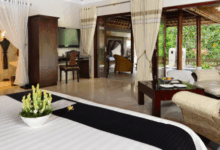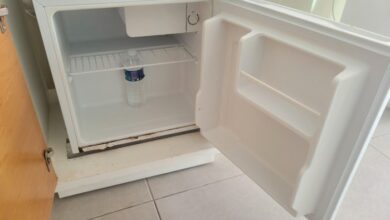Best Hotels For Remote Work With Fast Wi-Fi And Quiet Spaces
Best Hotels for Remote Work with Fast Wi-Fi and Quiet Spaces is a vital topic for today’s digital nomads and remote workers. As more individuals choose to work from various locations, the need for hotels that cater to their unique requirements becomes increasingly apparent. Whether you need fast internet for video calls or a peaceful environment to concentrate, finding the right hotel can significantly enhance your work experience.
Hotels equipped with robust Wi-Fi and quiet areas not only support productivity but also make traveling a more enjoyable experience. From well-designed workspaces to comfortable seating arrangements, these hotels cater to the needs of individuals looking to balance work and travel effectively. As we explore various options and features to look for, you’ll discover some of the best spots that seamlessly combine comfort and functionality.
Importance of Fast Wi-Fi for Remote Work
In the era of remote work, having reliable and fast Wi-Fi has become a fundamental requirement for many professionals. As teams increasingly rely on digital communication tools, the quality of internet connection directly influences productivity and overall work satisfaction. Fast Wi-Fi not only facilitates seamless communication but also supports efficient data transfer, essential for modern workflows.
The significance of fast Wi-Fi extends beyond mere connectivity; it profoundly affects the entire remote working experience. Slow internet can lead to delays in communication, hinder collaboration, and create challenges in accessing necessary resources. Such interruptions can be frustrating and ultimately detrimental to productivity. Research indicates that 40% of remote workers consider slow internet as a primary barrier to effective work.
Additionally, a report from Buffer revealed that 20% of remote workers find unreliable internet a major obstacle to their productivity. As a result, selecting accommodations with high-speed internet is vital for maintaining a smooth workflow.
Preferred Internet Speeds Among Remote Workers
Understanding the preferred internet speeds can help in identifying suitable hotels for remote work. Fast internet is essential not only for video conferencing but also for smooth operation of cloud-based services and quick downloads. Here are key statistics reflecting the preferences of remote workers:
- According to a survey by Statista, 70% of remote workers prefer a download speed of at least 25 Mbps.
- Research from Upwork shows that 85% of remote workers consider internet reliability as crucial, with many requiring speeds over 50 Mbps for optimal performance.
- The FCC suggests that a minimum of 25 Mbps download speed is necessary for a household with multiple users engaging in high-bandwidth activities like streaming and video calls.
In modern work environments, where collaboration tools such as Zoom, Slack, and Google Workspace are essential, the demand for fast and reliable Wi-Fi is more critical than ever. Ensuring access to adequate internet speeds not only enhances productivity but also fosters a more positive remote work experience.
Identifying Quiet Spaces in Hotels

Source: travelandleisureasia.com
When working remotely, finding a quiet space in a hotel can greatly enhance productivity and concentration. Quiet spaces are essential for minimizing distractions and creating an environment conducive to focused work. Understanding the characteristics of these spaces and knowing how to locate them within a bustling hotel setting can make a significant difference in your remote work experience.
A quiet space is typically defined by its low noise levels, comfortable seating, and good lighting. Ideal characteristics include being away from high-traffic areas like elevators, lobbies, and restaurants, which are often sources of noise. Additionally, spaces with soft furnishings, such as carpets and curtains, can help absorb sound, making them more conducive to work. Many hotels offer designated areas for work or relaxation that can provide an oasis of calm amidst the busy atmosphere.
Tips for Finding Quiet Spots Within Busy Hotels
Navigating through a busy hotel to find a quiet spot can be a challenge, but employing some strategic tips can lead to discovering the perfect workspace. Here are some effective strategies to identify those serene corners:
- Look for Business Centers: Many hotels have business centers equipped with private workstations or meeting rooms. These areas are often designed for quiet work and may provide additional amenities like printers and copiers.
- Check Out Lounges or Libraries: If the hotel features a lounge or library, these are often quieter than the main lobby. They provide comfortable seating and may even have designated quiet hours.
- Explore Outdoor Spaces: Patios, gardens, or balconies can serve as peaceful retreats. These areas not only provide a quiet environment but also allow you to enjoy fresh air and natural light.
- Request a Room in a Quiet Location: When booking your room, ask for one that is situated away from the elevator, ice machines, or any noisy amenities. Higher floors are often quieter due to reduced pedestrian noise.
- Visit During Off-Peak Times: If possible, choose to work during times when the hotel is least busy, such as mid-afternoon. This can help reduce foot traffic and overall noise levels.
Comparing Different Types of Hotel Room Layouts and Their Noise Levels
Hotel room layouts can significantly impact the level of noise you experience while working. Understanding how different types of rooms are designed can help you choose a more suitable option for remote work.
Generally, rooms located at the ends of hallways tend to be quieter than those near common areas. Standard layouts include:
- Standard Rooms: Typically located along hallways and near elevators, these can be noisy due to foot traffic and opening/closing doors.
- Suites: Suites often provide more space and may include separate living areas, which can help isolate noise from the bedroom, enhancing your ability to focus.
- Corner Rooms: Often quieter, corner rooms have fewer neighbors and less foot traffic, making them ideal for work.
- Rooms with Soundproofing: Some hotels advertise soundproofed rooms, which feature special insulation and double-glazed windows to block external sounds.
The layout and design of a hotel significantly contribute to the overall noise levels experienced by guests. Selecting the right type of room and location within the hotel can empower you to create an effective remote work environment tailored to your needs.
Features to Look for in Hotels for Remote Work
When selecting a hotel for remote work, certain features can significantly enhance productivity and comfort. It’s essential to look for amenities that cater specifically to the needs of remote professionals. Many hotels now offer tailored services and spaces designed to make working away from home more efficient and pleasant. The right environment can transform the work experience, impacting both productivity and well-being.
When searching for hotels ideal for remote work, several key amenities stand out as crucial for ensuring a seamless working experience.
Essential Amenities for Remote Work
Several features in hotels can support remote work effectively. As you explore options, consider the following amenities that can facilitate your work routine:
- Desks and Workspaces: A dedicated desk area where you can spread out your materials or set up your tech is vital. Look for hotels that offer rooms with desks or even designated workspaces within the hotel.
- Charging Stations: Having accessible charging stations for devices can save you from low battery anxiety. Opt for hotels that provide multiple charging options, including USB ports and additional power outlets.
- High-Speed Internet: While fast Wi-Fi is a given, ensure the hotel offers stable connections throughout the premises, especially in common areas and co-working spaces.
Comfortable Seating and Room Lighting
The importance of ergonomics in a hotel room cannot be overstated, especially for long hours of work. Comfortable seating and adequate lighting play a pivotal role in maintaining focus and productivity.
- Ergonomic Chairs: Look for hotels that provide adjustable chairs, allowing you to maintain proper posture during extended work periods. A supportive chair can reduce fatigue and discomfort.
- Natural and Adjustable Lighting: Good lighting is essential. Rooms with large windows providing natural light can boost mood and alertness, while adjustable lamps for evening work can help reduce eye strain.
Hotels with Co-Working Spaces or Business Centers
Many hotels are integrating co-working spaces or business centers to cater to the needs of remote workers. These areas are designed to foster productivity and collaboration.
- Co-Working Spaces: Some hotels have dedicated co-working areas equipped with high-speed internet, meeting rooms, and communal seating. For instance, the Hilton Garden Inn features a business center that includes workstations and meeting facilities.
- Business Centers: Many upscale hotels provide business centers with printing, scanning, and faxing services. The Marriott chain often includes business centers for guests to utilize, making it convenient for remote work tasks.
Best Hotels for Remote Work in Various Locations

Source: premiumdigitalcontrol.com
Finding the right hotel for remote work is essential for productivity, comfort, and a good work-life balance. With the increasing trend of digital nomadism, many hotels have upgraded their amenities to cater specifically to remote workers. This section delves into some of the best hotels across major cities worldwide, comparing their offerings such as Wi-Fi speed, quiet spaces, and proximity to coworking spaces or cafes.When selecting a hotel for remote work, it’s vital to consider various factors, including cost, location, and the specific needs of your work environment.
Below is a comparison table of top hotels in major cities that are ideal for remote work, along with their Wi-Fi speed ratings.
Comparison of Top Hotels for Remote Work
| Hotel Name | City | Wi-Fi Speed (Mbps) | Price Range | Notable Features |
|---|---|---|---|---|
| Hyatt Place | New York | 100 | $$ | 24/7 business center, quiet zones |
| Marriott Marquis | San Francisco | 150 | $$$ | Rooftop lounge, close to coworking spaces |
| The Ritz-Carlton | Toronto | 200 | $$$$ | Luxury amenities, meeting rooms available |
| Holiday Inn Express | London | 75 | $ | Complimentary breakfast, workstations |
| Novotel | Melbourne | 100 | $$ | Pet-friendly, close to cafes |
Budget-Friendly and Luxury Hotels Ideal for Remote Workers
There are excellent options for both budget-conscious and luxury-seeking remote workers. Below is a categorized list of hotels that cater to varying budgets, ensuring you find a suitable place without compromising on essential amenities.
Budget-Friendly Hotels
- Holiday Inn Express – Offers free Wi-Fi and comfortable workspaces at an affordable price.
- Hostelworld – Several hostels have now upgraded their facilities to include quiet work areas and high-speed internet.
- Comfort Inn – Known for its reliable Wi-Fi and convenient locations near cafes and coworking spaces.
Luxury Hotels
- The Ritz-Carlton – Provides high-speed internet and an upscale atmosphere perfect for distractions-free work.
- Four Seasons – Offers exceptional service and luxurious work environments to enhance productivity.
- W Hotels – Known for their trendy ambiance, these hotels offer coworking spaces and high-quality amenities.
Hotels Near Popular Coworking Spaces and Cafes
Staying near coworking spaces or popular cafes can enhance networking opportunities and provide a change of scenery. Here are notable hotels strategically located near such venues:
- Hotel Indigo – Located in the heart of many urban centers, often adjacent to popular coworking spaces.
- AC Hotel by Marriott – Typically situated near cafes that cater to remote workers, enhancing collaboration and networking.
- Crowne Plaza – Known for its business-friendly services, these hotels are often located near bustling coworking areas.
“Choosing the right hotel can significantly impact your productivity and overall remote work experience.”
Guest Reviews and Recommendations

Source: essence.com
Guest reviews play a crucial role in determining the best hotels for remote work, especially regarding Wi-Fi quality and work-friendly environments. With the increasing number of professionals working from various locations, firsthand experiences provide valuable insights for choosing accommodations that cater to remote work needs. Reviews not only highlight the strengths of a hotel but also expose potential drawbacks that can significantly impact productivity.When it comes to remote work, guest feedback often emphasizes the critical aspects of Wi-Fi performance and the overall atmosphere of workspaces.
Many guests share their experiences, detailing the reliability of the internet connection, speeds, and the availability of quiet spaces conducive to focused work. Positive testimonials can help prospective guests identify hotels that excel in these areas, while negative reviews often serve as warnings. By exploring a range of reviews, travelers can make informed decisions based on the experiences of fellow remote workers.
Impact of Guest Feedback on Hotel Choices
Guest feedback significantly influences the selection of hotels suitable for remote work. Potential visitors often turn to platforms like TripAdvisor, Google Reviews, and specialized travel forums to gauge the experience of others. The following points illustrate how guest testimonials affect hotel choices:
-
Ratings and Reviews
provide a numerical and qualitative assessment of a hotel’s work environment, heavily guiding decisions.
-
Wi-Fi Performance
is frequently mentioned in reviews, with guests sharing their download and upload speeds, which inform future guests seeking reliable connections.
-
Quiet Spaces
are highlighted by those who prioritize an undisturbed environment, helping others find hotels with comfortable and conducive work settings.
-
Overall Experience
includes factors like staff support, availability of meeting rooms, and additional amenities that enhance the remote work experience.
Comparison Reviews of Hotels Based on Remote Work Suitability
When comparing hotels, guest reviews provide essential context for evaluating which establishments best support remote work. Here’s a summary of how different hotels stack up based on feedback:
1. Hotel A
Praised for its
lightning-fast Wi-Fi
and
multiple quiet areas
designed for focused work, making it a top choice for remote workers.
2. Hotel B
Noted for its friendly staff and
excellent coworking spaces
. However, some guests reported intermittent Wi-Fi issues during peak hours, which might be a concern for those needing stable connections.
3. Hotel C
Offers a unique blend of modern amenities and serene environments. Guests commend its
dedicated business center
with consistently reliable internet, making it ideal for prolonged work sessions.
4. Hotel D
While the ambiance is favorable and conducive to working, reviews indicate that
Wi-Fi struggles
can detract from the overall experience, making it less suitable for those reliant on a strong connection.By leveraging guest reviews and recommendations, remote workers can effectively choose hotels that not only meet their needs but also enhance their productivity during travel.
Regional Variations in Hotel Amenities
Hotel amenities can vary significantly depending on the region, impacting the remote work experience for digital nomads. Understanding these differences can help remote workers choose the best accommodations that suit their needs. From urban centers with high-speed internet and co-working spaces to rural getaways offering tranquility and unique local experiences, the amenities available can shape the effectiveness of one’s remote work routine.Cultural expectations around work also play a crucial role in determining hotel amenities and setups.
In cities around the world, remote workers often find hotels equipped with modern technology and facilities designed to support productivity. Conversely, rural hotels might focus more on providing peace and quiet, with fewer technological distractions.
Urban Versus Rural Hotel Options for Remote Work
Urban hotels typically cater to business travelers and remote workers, featuring amenities such as high-speed Wi-Fi, business centers, and comfortable workspaces. These hotels often have the following amenities:
- High-speed internet connectivity, essential for video conferencing and large file uploads.
- Business lounges or co-working spaces equipped with necessary technology.
- On-site cafes and restaurants, perfect for quick meals or coffee breaks.
- Proximity to public transport and business districts, allowing easy access to meetings or networking events.
In contrast, rural hotels focus on providing a serene environment that promotes relaxation and creativity. They may offer:
- Peaceful locations surrounded by nature, ideal for inspiration and focus.
- Fewer distractions, allowing for prolonged periods of uninterrupted work time.
- Unique local experiences, such as workshops or outdoor activities, that can refresh the mind during breaks.
While rural hotels may lack in high-tech amenities, they often make up for it with charm and tranquility, offering a distinctive work-life balance that can be very appealing.
“Choosing the right setting for remote work is as crucial as having the right tools; both urban and rural hotels offer unique benefits tailored to different work styles.”
Cultural differences also influence the work environment and hotel setups across countries. For example, in Nordic countries like Sweden and Denmark, there is a strong emphasis on work-life balance, often reflected in hotel designs that incorporate wellness amenities such as spa facilities and calm communal areas for relaxation. In contrast, in bustling metropolises like New York City or Tokyo, hotels may prioritize functionality over comfort, providing small but efficient workspaces to cater to the fast-paced lifestyle of urban dwellers.Understanding these regional variations allows remote workers to select hotels that not only meet their technological needs but also align with their personal work preferences and cultural values.
Strategies for Maximizing Remote Work Productivity in Hotels
Staying productive while working remotely in hotels can be a challenge, but with the right strategies, you can create an effective workspace that boosts your efficiency. Understanding how to manage your time effectively, establish routines, and minimize distractions is crucial for making the most of your remote work experience in a hotel setting.Maintaining productivity while traveling requires thoughtful planning and the implementation of key strategies.
Here are some effective methods to enhance your work performance while enjoying the comforts of a hotel room.
Time Management Techniques for Remote Workers
Utilizing time management techniques is vital for remote workers to stay focused and meet deadlines. Prioritize your tasks by using methods like the Eisenhower Matrix, which helps classify tasks based on urgency and importance. This approach allows you to tackle high-priority tasks first, ensuring that essential work gets done efficiently.Consider implementing the Pomodoro Technique, where you work in focused bursts of 25 minutes followed by a 5-minute break.
This method can keep your mind sharp and reduce burnout. For tasks that require more time, allow yourself longer breaks to recharge before diving back into work.
Importance of Establishing a Daily Routine
Creating a daily routine while traveling can provide a sense of normalcy and structure. A routine helps signal to your brain that it’s time to work, creating a mental separation between leisure and productivity. Start your day at the same time to maintain consistency, and allocate specific hours for work tasks just as you would in a traditional office setting.
Incorporate time for meals, exercise, and breaks to ensure you’re taking care of your physical and mental health. A well-structured routine can help you stay focused and achieve a balanced work-life dynamic, even in a hotel environment.
Minimizing Distractions in Hotel Settings
Hotels can present various distractions that may hinder your focus during work hours. To mitigate these interruptions, create a dedicated workspace in your hotel room. Choose a location away from noise, such as near a window or in a corner, where you can minimize disturbances from foot traffic or outside sounds.Using noise-canceling headphones can also be beneficial for blocking out background noise.
Additionally, consider setting boundaries with fellow travelers or hotel staff, informing them of your work schedule to reduce unexpected interruptions. Establishing a “do not disturb” sign on your door can signal to others that you’re in a focused work mode. To further limit distractions from digital devices, silence notifications and set specific times to check emails or social media.By applying these strategies, remote workers can enhance their productivity levels while enjoying the comfort and flexibility that hotels provide.
Maximizing your workspace efficiency in a hotel can lead to a more satisfying and successful remote working experience.
Outcome Summary
In conclusion, the right hotel can transform your remote work experience, providing the perfect blend of fast Wi-Fi and serene spaces. As you navigate through various locations, keep in mind the essential amenities and features that support your productivity. By making informed choices based on reviews and amenities, you can ensure that your work travels are both effective and enjoyable.
Happy travels and productive working!
FAQ Summary
What should I look for in hotel Wi-Fi?
Look for hotels that specify high-speed internet, ideally with a minimum of 25 Mbps download speed for smooth video conferencing and uploading.
How can I find quiet spaces in busy hotels?
Check for rooms located away from elevators, ice machines, and high-traffic areas, or explore lounges and business centers designed for quiet work.
Are there hotels that allow for extended stays while working remotely?
Yes, many hotels offer extended stay options with amenities tailored for longer visits, including kitchenettes and laundry facilities.
Do hotels typically have power outlets near desks?
Most hotels provide power outlets near desks, but it’s wise to confirm this in advance or pack a power strip for convenience.
How important is the hotel’s location for remote work?
The hotel’s location can be significant, especially if it’s near coworking spaces, cafes, or business districts that facilitate networking opportunities.









